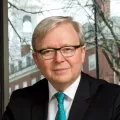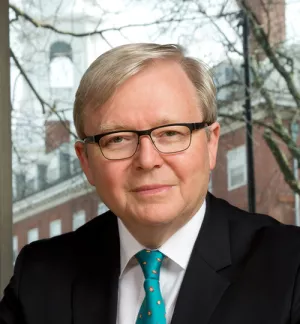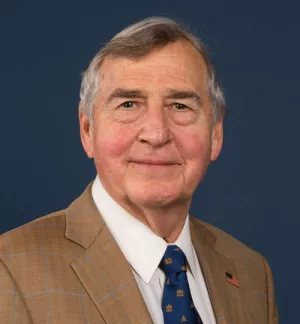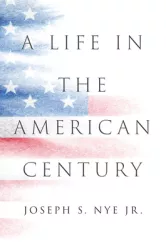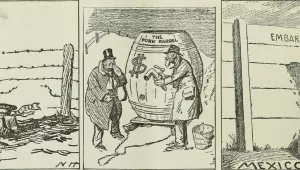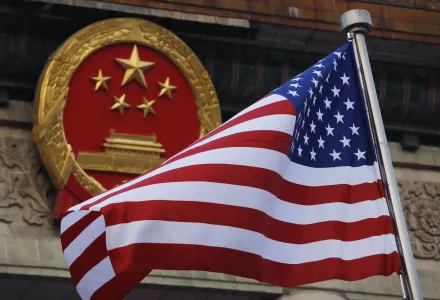
A Collection of Major Speeches Given During 2018 by the Honorable Kevin Rudd
Forward and Introduction by Graham Allison
The defining issue of international relations in the 21st century is the rivalry between a rising China and a ruling US. The impact of this rivalry is redefining the international order of which the US has been the principal architect and guardian. Readers who want an in-depth briefing on this challenge have a treat in store. Within the covers of this book, long-time China watcher and former Australian Prime Minister Kevin Rudd has provided an analytic snapshot that would normally only be available to the president or prime minister of a major nation. In substance, it would be the envy of the best professional intelligence agency.
Rudd’s portrait of the relationship today between the established and emerging superpowers reflects a lifetime studying China and the US, informed by ongoing conversations with leaders in both Beijing and Washington. Following in the footsteps of Lee Kuan Yew and Kissinger, Rudd has managed to establish relationships with leaders in both governments and societies that allow him to provide insights to each about the other and to offer candid views from an independent third-party perspective.
To this role, Rudd brings unique qualifications. A proud Australian, he is geographically Asian, on the one hand, and culturally Western, on the other. Having mastered Mandarin and English in his youth, he has been able to speak to both Chinese and Americans in the nuance of their native languages. For American policymakers, Australia occupies a special place as one of America’s most reliable allies—indeed, the only nation that has fought alongside the US in every one of its wars since World War I. Chinese respect Australia as a big country that is, for all of its western characteristics, unquestionably anchored in Asia.
As a young Foreign Service officer Rudd was posted to China in the 1980’s. From there he rose to become his nation’s Foreign Minister, Leader of the Opposition, and ultimately its Prime Minister from 2007 to 2010 and again in 2013. During his tenure as Prime Minister, he hosted China’s Vice President Xi Jinping for a 10-day visit to Australia in 2010. These experiences in “doing” have informed his analysis of international challenges, refining his sense of connections between domestic politics and foreign policy. They have also given him a sense for the special perspective a head of state brings to that undertaking.
2018 marked a sea change in Washington’s conventional wisdom about China. In a major speech in October that will be noted for years to come, Vice President Pence summarized the Trump Administration’s ‘emergent strategy’ to address the China challenge. As he announced, the Trump Administration is determined to fight back on all fronts in what it sees as a Cold War that China has been waging against the US for the past quarter century without any US response.
Previous administrations made a cosmic bet. They wagered that integrating China into the US-led international order would lead it to develop a normal free market economy, democracy, the rule of law guaranteeing human rights, and acceptance of its place as a “responsible stakeholder.” As Pence said bluntly, they lost that bet—and the Trump administration was left to deal with the consequences.
Amid this storm, China’s leaders have grimly concluded that their own long-held suspicions have been confirmed: the trade war is seen as merely one instrument in a comprehensive campaign to “contain” China. The sea change in Washington has sent Chinese strategists back to reading the ancient Greek historian Thucydides and his insight about the ways in which Athens’ rise and the fear that this instilled in Sparta caused a catastrophic war.
As Thucydides explained, the objective reality of a rising power’s impact on a ruling power is problem enough. But in the real world, these objective facts are perceived subjectively—magnifying misperceptions and multiplying miscalculations. When one competitor ‘knows’ what the other’s ‘real motive’ is, every action is interpreted in ways that confirm that bias.
As Rudd explains, this dynamic is driving both nations into a competition that can only lead to confrontation—and that could even lead to war. The challenge for thinking individuals in both countries is thus: how to escape Thucydides’s Trap?
In a series of speeches given over the course of 2018, Rudd has clarified this challenge. At West Point in March, he identified seven layers of Chinese core interests beginning with the survival of the regime. In Singapore in June, he explained how early training in Marxism still colors Xi’s worldview. In Silicon Valley in September, he shifted our attention to the high tech sphere as the new battlefront of US-China competition, inviting us to consider the ramifications of a full-blown US-China tech war as a “struggle to secure the commanding heights of the new technologies that will either drive, or destroy, the economies of the 21st century.” At the Naval Academy in October, he highlighted the stark transition of America’s China policy from ‘strategic engagement’ to ‘strategic competition,’ outlining ten key questions that must be answered for the US to develop a coherent China strategy. In Jakarta in November, he analyzed how the emerging US-China strategic rivalry will affect Southeast Asia. Finally, in New York in December, Rudd delivered a tour de force on the prospects for US-China relations in 2019 amidst increasing distrust on both sides.
Among the questions he addresses directly are: how does Xi Jinping see the world, what does he want, and how is China changing under his leadership? How is America changing under Donald Trump? To what extent have the traditional moorings of the US-China relationship constructed over the last 40 years now been severed? Is a new strategic equilibrium now possible based on a new common strategic narrative for the relationship—or is a new state of war, cold or otherwise, now inevitable?
As Rudd concludes: “We are dealing with profoundly complex questions. Indeed, it is historically unprecedented to be in the midst of a debate about whether the world’s largest economy and oldest continuing democracy, can happily co-exist with the world’s second largest economy and oldest continuing civilization, given that the latter has never exhibited in its history any attraction to liberal democratic norms. But grapple with the debate we must. And resolve it we must as well. One way or the other.”
Rudd, Kevin and Graham Allison. “The Avoidable War: Reflections on U.S.-China Relations and the End of Strategic Engagement.” Asia Society Policy Institute, January 2019
The full text of this publication is available via Asia Society Policy Institute.

